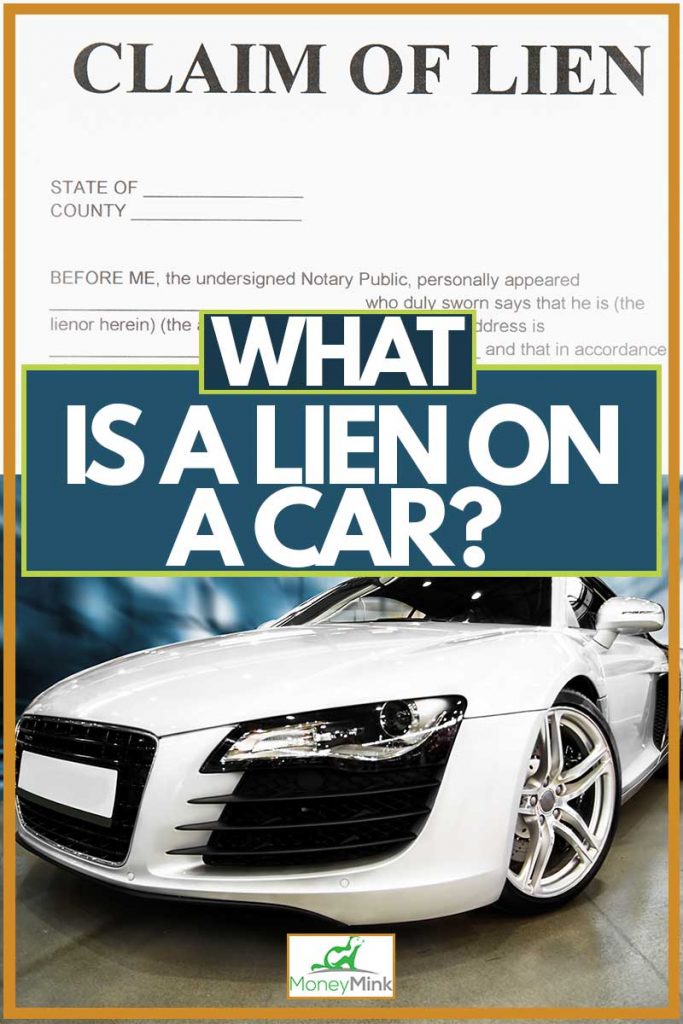Many vehicle owners understand what a loan is, but when it comes to liens, they have more questions than answers. Fortunately, we've researched the subject to uncover all the details you need to know.
A lien on a car means that someone else has an ownership interest in your vehicle. This means:
- You owe someone money.
- You must pay them whatever you owe before you can sell your car.
- They might be able to repossess the car and sell it to settle your debt.

Not every vehicle has a lien on it, but if you do have one, there's more you need to know about how it will affect your credit, your ability to sell the car, and the registration.
What Does a Vehicle Lien Mean?
A vehicle lien means that you owe money to someone and that the car's value is standing in for whatever amount you owe. Whoever holds the lien has part ownership in the vehicle until you settle your debt with them.
Does My Vehicle Have a Lien?
There are a few ways to tell whether your vehicle has a lien on it. First, if you bought it with financing or a loan from a bank, it will have a lien on it by default. The lien means you haven't paid off the car yet, and the financing agency or entity has an ownership interest in your property. So, if you don't make the payments on time, the financial institution can repossess your car or truck to get their money back. They don't have to ask for permission to do so, either.
But if you own your car outright, whether you bought it cash or have paid off the loan, it may still have a lien on it. If you have unpaid bills that are in collections, for example, creditors might list your vehicle as a means of repayment. If you sell the car, the creditor gets a cut of the funds to pay the debt you owe.
Who Holds the Lien on My Car?
When you apply for a vehicle loan at your bank or credit union or pursue financing through a dealership, whoever funds the purchase is the lienholder. A lienholder, therefore, can be a bank, credit union, dealership, or anyone else that grants loans to consumers. If you bought your vehicle with a finance package, the lienholder should be listed on the title.
If you own the automobile outright, someone else can still put a lien on it (or your other property). The bad news is that you may not know about it unless you do some research. The entity that holds a lien on your car could be a bank, mortgage lender, hospital, mechanic, or anyone else you owe money to. Debt collectors, in general, can place liens on private property.
How Can Someone Place a Lien on My Car?
An individual can't place a lien on your property, except in limited circumstances. Generally, the person or entity must go to court to secure a judgment against you. The judgment allows them to place a lien on your vehicle, house, or other real property. The bad news is that even your local mechanic can take court action against you if you refuse to pay your bill. Anyone who has proof that you owe them money can petition the court for a judgment that entitles them to take out a lien on your vehicle.
Debt collectors also use the court system to file judgments for liens against consumers.
The IRS can also place a lien against you if you don't pay your taxes. This includes income, estate, and property taxes, so make sure to keep up on your tax situation.
Does a Car Lien Affect Your Credit?
If your car has a lien because you financed it, it won't negatively impact your credit. Finance liens are called consensual liens, which means there's no judgment against you, and you haven't skipped out on a debt.
Generally, as long as you make your vehicle payment, it's a positive boost to your credit score. Want to learn more about how car loans impact your credit? See our related article, Do pre-approvals for a car loan affect your credit score?
However, a statutory lien, such as a mechanic's or tax lien, will impact your credit. The statutory types can stay on your credit for up to seven years. Judgment liens can also cause your credit to tank, and they remain on your credit report just as long as statutory liens.
Can a Vehicle Be Sold with a Lien?
The short answer is yes, you can sell a vehicle with a lien on it, but it isn't very easy. You must satisfy the terms, including paying off whatever debt you owe, before a new owner can receive the vehicle title.
What Happens If I Buy a Car With a Lien?
 It's not a good idea to buy a car with a lien unless you have proof that it has been removed or you and the seller are working together to remove the lien through other means. On a related note, read more on transferring a loan (and its lien) here: Are Car Loans Transferable?
It's not a good idea to buy a car with a lien unless you have proof that it has been removed or you and the seller are working together to remove the lien through other means. On a related note, read more on transferring a loan (and its lien) here: Are Car Loans Transferable?
Even if the seller's vehicle title doesn't show a lienholder, you should still double-check the VIN number to confirm it's a legitimate sale. In most states, you can look up a vehicle to see whether there is a lien on it, regardless of the financing status.
How Do You Get a Lien Removed?
The easiest way to get a lien removed is by paying your debt. Whether that means paying the balance on your car loan or an obligation to a collection agency, mechanic, or anyone else, putting up the cash to absolve the overdue balance is ideal.
Of course, it's not always possible to pay down your debt up-front.
In that case, you may be able to set up a payment plan or other workaround with the person or institution you owe money to. Even then, however, they may not remove the lien until they get the final payment on your account.
How Long Does It Take to Get a Lien Release for a Car?
If it's a consensual lien from financing your car purchase, the lien will end when you make the final payment on your auto. You'll get the new title in the mail, along with a letter from the lienholder explaining that you're no longer on the hook with them.
But if there's a lien on your car because of other financial troubles, it could take longer to get the release. There's a waiting period of 30 to 60 days, during which the lien release may go directly to the department of motor vehicles or the county recorder office.
Sometimes, the debtor will receive the release directly. If you receive the lien release in the mail, you might need to file paperwork or visit the DMV to get your new title.
Understanding what car liens are and how they work is vital when you have a vehicle loan. But it's still relevant even if your vehicle is paid off since creditors can come after you and your vehicle with little warning.



